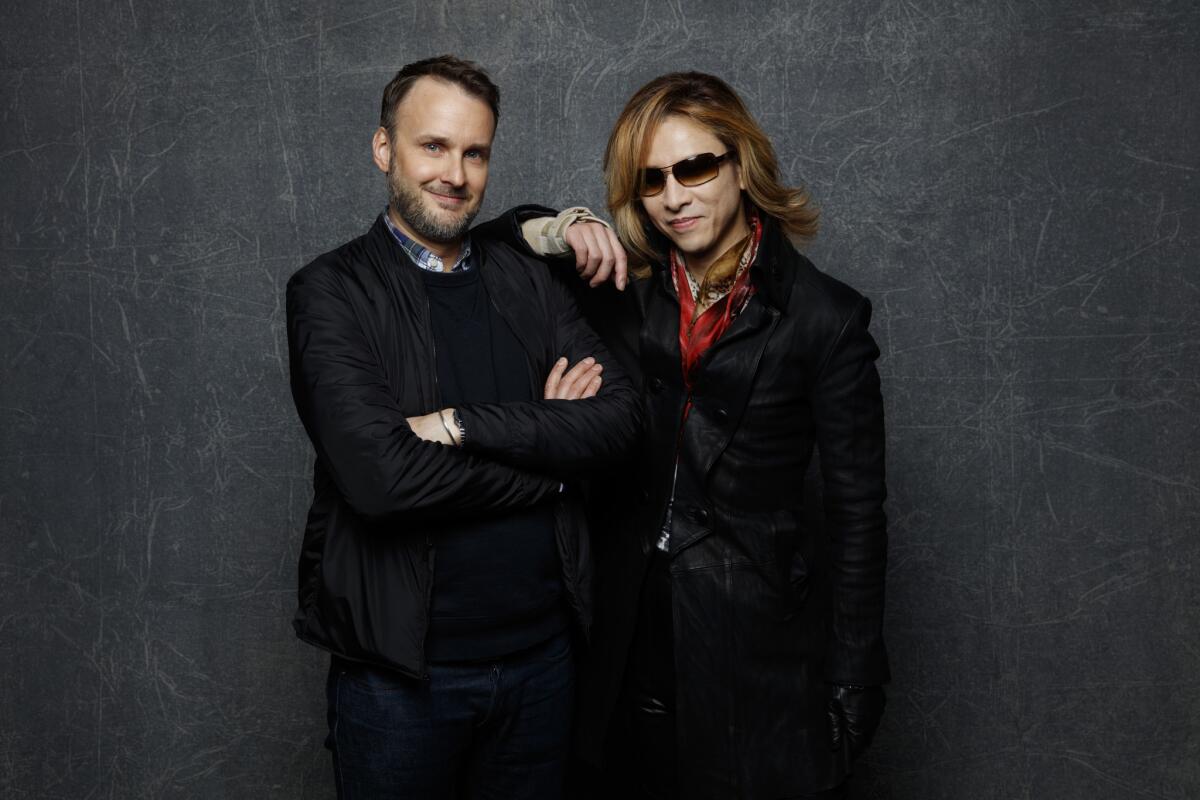X Japanâs triumphs and tragedies are documented in âWe Are Xâ

Three years ago, documentary filmmaker Stephen Kijak had never heard of a band called X Japan. Most Americans hadnât either, even with more than 20 million albums sold around the world, but Kijak was intrigued.
He learned of a sound that incorporated thrash metal and classical piano with big prog-rock flourishes and a flamboyant Japanese âVisual Keiâ image of mascara, mohawks and neon attire. âNow I drive 90 miles an hour in L.A. whenever your songs come on,â says Kijak with a smile, sitting across a table from bandleader Yoshiki Hayashi last week at the Sundance Film Festival in Park City, Utah.
See more of Entertainmentâs top stories on Facebook >>
The documentary âWe Are X,â which premiered at Sundance on Jan. 23, is the latest in a series of music films directed by Kijak. Heâs made documentaries on the Rolling Stones (âStones in Exileâ), the Backstreet Boys (âShow âEm What Youâre Made Ofâ) and collaborated with executive producer David Bowie on 2006âs âScott Walker: 30 Century Man.â The new film had Kijak following X Japan around the world, from an explosive concert in Madison Square Garden to gravesites in Japan and back to Los Angeles.
âThis allows me to indulge one of my great passions,â says Kijak. âIâm not a social issue filmmaker. I like creative people. I like to know what makes musicians tick.â
For the leader of X Japan, who usually goes by the single name Yoshiki or Yoshi, the film is another step toward the quintetâs career-long goal of crossing over to American audiences. Itâs no accident that Yoshiki has lived in Los Angeles for nearly 20 years.
âBreaking the boundary is always our dream,â says Yoshiki, the groupâs drummer-pianist-composer, preparing this fall to release the bandâs first new album in two decades. âX Japan was always breaking the wall â east and west, negative side and positive side, whatever the wall. I donât know how long it will last, but as long as we are alive, we are going to try.â
He bought the North Hollywood studio where Metallica recorded the 1991 release known as âThe Black Album.â âI wanted to book the studio because every engineer in Los Angeles said thatâs the best drum-sounding room, and Iâm a drummer.
âThe studio was booked one-year straight, so the only way I could use the studio was to buy it,â Yoshiki said. Heâs since moved into a different studio on the edge of Studio City and Hollywood.
Dressed in scarves, sunglasses and a leather coat, Yoshiki wears a black glove on his left hand. On his right wrist is a brace, the result of decades of punishment onstage. He will soon decide between surgery and therapy on the arm â one best for his drumming, the other better for his piano playing. He says he canât imagine slowing down on either.
The story of X Japan is more than musical, balancing career triumph with years of personal tragedy dating to Yoshikiâs childhood, when his father committed suicide. That same year he discovered the band Kiss, and by 1982 started a teenage band that would become X Japan with friend and singer Toshimitsu Deyama.
Six years later, the group released a debut album, âVanishing Vision,â just as the Sunset Strip hair-metal scene was erupting across the ocean. While X Japan shared some surface-level sounds and hair products with their western contemporaries, it was only a starting point. X Japan incorporated Kabuki theater and musical influences stretching from Bowie to Iron Maiden.

âIn my lyrics, I talk about death a lot. Somehow I make it positive,â says Yoshiki. âWithout music, I donât think I would survive. Instead of killing myself or jumping off a bridge, writing lyrics and melody really saved me.â
In the film, Yoshiki recounts his message to the rest of the band: âI told them, âTrust me, give me everything. Iâll make everything happen.â Itâs like creating a new family.â
During that initial wave of success, the band released five studio albums, six live recordings and more. But the band broke apart in 1998 after performing its âLast Liveâ farewell concert at the 55,000-seat Tokyo Dome on New Yearâs Eve. Later that year, lead guitarist Hide hanged himself. In 2008, the band re-formed, but in 2011 bassist Taiji died following a suicide attempt.
âYou can scan the Wikipedia page and see the plot points: record-selling, death, death, suicideâŚ,â says Kijak. âAll the ingredients are there: This is great stuff. But how do you tell it? How do you create empathy, how do you break down what is perceived as the surface?â
For most of his life, Yoshiki had avoided publicly speaking of the deaths and his personal history. For the film, he agreed to talk, but it took five interviews over two years to fully pull the story out of him.
âYou see the surface, which is spectacular and dazzling and just bizarre,â says Kijak. âThe music does pull you in just because of its intensity and speed. And I always argue the compositional integrity of having speed metal composed by someone who is also a classical musician is also quite unique.â
Kijak keeps a photo of Hide on his cellphone for inspiration. In the image, the late musician stares into the lens, hair wildly coiffed. âHe seemed to embody some kind of spirit of rebellion that extended beyond the band,â says Kijak, âand it still influences people today.â
âYouâve got to connect on a human level to get these stories to make sense for an audience. Iâm interested in the interior lives of artists, musical process, but it has to operate on a human level.... I just hope to spread the word. Itâs very simple.â
MORE
Grammy Awards to broadcast âHamiltonâ opening number live from Broadway
âFresh Off the Boatâ celebrates Chinese New Year, showcasing greater diversity on TV
KISS goes J-pop with tween sensations MCZ
BigBang explodes K-Pop convention at the Honda Center
Babymetal shreds heavy-metalâs seriousness at the Fonda
More to Read
The biggest entertainment stories
Get our big stories about Hollywood, film, television, music, arts, culture and more right in your inbox as soon as they publish.
You may occasionally receive promotional content from the Los Angeles Times.











